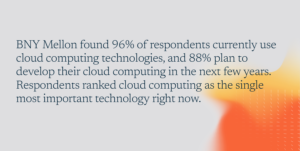Given the volatility of the last two years, asset managers are looking to either retain or gain a competitive edge based on what they believe will be lasting changes in the market. To that end, private equity managers are focused on appealing to new investors, raising funds to increase assets under management, and enhancing returns for their investors.
Larger asset managers are prioritizing new distribution channels and building new products, including direct-to-consumer products. Additionally, managers of all sizes have begun to focus on winning the retail investors coming into the private markets.
These priorities are in conjunction with the overall goals of introducing new efficiencies and cutting costs. Given the many intersecting goals, asset managers need the right tools and service providers. They can’t do everything on their own.
Leverage these tools to gain a competitive advantage in the private markets
1. Advanced technology & automation
Asset managers of all sizes need to pay close attention to their tech stack. Firms can improve efficiency, reduce costs, and develop new abilities by adopting technology solutions for various business functions, including operations, human resources, finance, legal, investor relations, and dealmaking.
For back- and middle-office processes, technology solutions let employees handle a higher volume of tasks without hiring more people, which in turn supports the firm’s ability to scale.
The right tech can also reduce time spent on non-core functions. Employees, including business professionals and in-house counsel, can focus on core strategies, like developing new products, building relationships with investors, and raising funds, instead of manual, time-consuming tasks.
While there are many cloud-based or Software as a Service solutions out there, asset managers can use products created specifically for the financial services industry. For example, not all contract lifecycle management solutions offer the features and workflows that address asset managers’ specific needs. The solutions that do address firms’ needs provide a better chance for asset managers to realize the efficiencies and savings they expect.
While searching for technology solutions, asset managers should be on the lookout for artificial intelligence and automation. Various software solutions and technology vendors offer some type of automation, whether it’s automatic notifications within a technology platform or automation coupled with outsourcing services.
Firms can review when and where automation is available and whether they can use it to achieve further efficiencies. For example, contract automation can save in-house lawyers’ and deal professionals’ time when handling high-volume, routine contracts.
Finally, another reason firms should prioritize advanced technology solutions is to tackle their data. Asset managers gather and generate large quantities of data, including investment data. Technology is the only way to become equipped to develop effective data management and analytics — an operational priority for many firms in 2022, according to BNY Mellon’s research study, Asset Management: Transformation Is Already Here.
Firms with the ability to gather, sort, and analyze data can:
- Drive investment performance
- Restructure and rationalize product offerings
- Reduce operating model costs
- Use digital tools to connect with investors
2. The cloud
Some asset managers and other highly regulated organizations have been skeptical of the cloud for years. But firms’ reluctance has given way to acceptance as they recognize the advantages of moving from dedicated servers to the cloud. Also, cloud service providers achieving security certifications and SOC 2 compliance assuaged firms’ fears over information and cybersecurity.

Firms realized (or confirmed) the value of the cloud during the COVID-19 pandemic when they couldn’t rely on manual processes taking place in the office. Suddenly, firms had to support a distributed workforce. Cloud-based technologies along with the right communication and collaboration solutions enabled teams to effectively work remotely and to continue to do so today. In the survey, 60% of respondents ranked introducing new investment technologies to support remote work as a top priority, signaling some type of distributed workforce is here to stay.
Cloud solutions also support firms’ goals of becoming more resilient and agile in the face of unprecedented events. The past two and a half years have proven that there’s no way to predict the future, and firms have to be ready for anything from pandemics to military actions. Adopting advanced technology and cloud-based solutions helps firms enhance their operational resiliency.
3. Outsourcing
Asset managers don’t have to do everything in-house and, in some cases, they shouldn’t. Insourcing every single task can be costly and inefficient. Instead, firms can benefit from coupling advanced technology with outsourcing services.
Firms should weigh the advantages of keeping repetitive tasks in-house versus outsourcing. Partnering with a third-party provider, such as an alternative legal services provider, can cut costs. It might cost less to have external resources handle certain tasks instead of paying in-house legal or business professionals.
Better yet, outsourcing high-volume, repetitive tasks frees up employees’ time. Business and legal professionals who aren’t tackling routine tasks have more opportunities to focus on the firm’s core strategies, such as fundraising, identifying deal targets, and increasing value for investors.
Whether firms choose to insource or outsource particular functions depends on their size and business goals. They can consider outsourcing some aspects of:
- Fund administration
- Accounting
- Tax
- Compliance
- Legal services
- Contract management
- Investor relations
- Information technology
- Human resources
- Benefits
- Payroll
- Employee training
- Background investigation services
- Insurance
BNY Mellon found 90% of survey respondents were considering exploring or expanding outsourcing for the back office, and 61% were considering outsourcing for the middle office.
Outsourcing also helps firms use technology solutions that would be too heavy of a lift on their own. Partnering with an outside vendor can give an asset manager access to the expertise they need to improve their technology and security infrastructure and data management. This will be a popular theme moving forward, as BNY Mellon found 97% of respondents were considering exploring or expanding outsourcing for data management infrastructure (tech used to store, manage, and retrieve data) and 78% were considering outsourcing for data operations.


